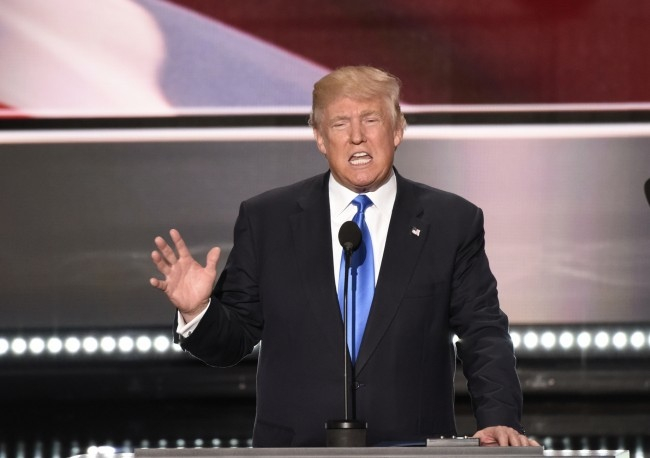
This week, Donald Trump formally accepted the GOP presidential nomination at the Republican National Convention. He also sat down with the New York Times and outlined a somewhat curious foreign policy. In doing so, Trump said he may not honor the core tenet of the NATO military alliance, and instead, he would first analyze the contributions other countries made to the alliance, before deciding if they deserve help.
Trump’s proposed “what have you done for me lately” defense approach has set off alarms for several European countries and members of the press. The media mogul went on to say NATO’s 28 member countries would have to “defend themselves” if they have not met proper financial obligations:
“You can’t forget the bills. They have an obligation to make payments. Many NATO nations are not making payments, are not making what they’re supposed to make. That’s a big thing. You can’t say forget that.”
Holding the ideology of a landlord may not be the best way to handle foreign affairs. As the interview progressed, Trump seemed to reject standard military and foreign policy assumptions the U.S. has held for years, instead looking at the economic impact each decision would have.
In the event of an attack upon a NATO member, other members of the alliance generally rally together to help out. This sort of “one for all, all for one” mentality has been in place since the alliance was started in 1949. Nothing in Trump’s campaign has been conventional so far, and his latest statement is par for the course. But many are worried that this stance could have major ramifications and actually support Russian intimidation methods:
https://twitter.com/zackbeauchamp/status/755981940579299332
Pence says we can't "apologize to our enemies and abandon our friends," as Trump gives an interview saying he wouldn't defend NATO counties
— Chris Hayes (@chrislhayes) July 21, 2016
Trump on NATO amounts to: I'm going to be sufficiently vague and shake down allies in crisis in a way most likely to trigger nuclear war.
— Josh Marshall (@joshtpm) July 21, 2016
We have had decades of bipartisan commitment to NATO, which has made it the greatest alliance in history. Trump is now threatening that.
— Michael McFaul (@McFaul) July 21, 2016
Trump has expressed his admiration for Vladimir Putin in the past, so it doesn’t seem to be a stretch. And some have questioned whether Trump is working hand in hand with Russia. Hillary Clinton’s team released a statement condemning Trump’s statements, even saying The Gipper would shake his head at this:
“For decades, the United States has given an ironclad guarantee to our NATO allies: We will come to their defense if they are attacked, just as they came to our defense after 9/11. Donald Trump was asked if he would honor that guarantee. He said… maybe, maybe no. Ronald Reagan would be ashamed. Harry Truman would be ashamed.”
After the Times interview came out, Trump’s camp was quick on the PR front, reiterating Trump was cool with policies already in place. Trump Campaign Chair Paul Manafort said the Republican candidate believes in the NATO agreement and simply stated the Times interview was inaccurate.
Manafort tells me NYT misquoted Trump on defending NATO allies and respecting existing agreements. Says it does this a lot. NYT, got a tape?
— David Corn (@DavidCornDC) July 21, 2016
It may be wise to take Manafort’s statement with a grain of salt, as he has shown an ability to stretch the truth. Maggie Haberman, one of the authors of the Times piece, quickly shot back at Manafort saying he was nowhere present during the interview:
he wasn't in the interview and unlikely he had time to catch up to it before convention program began. Transcript soon.
— Maggie Haberman (@maggieNYT) July 21, 2016
Once again, Trump has created a quote storm. His businesslike approach to foreign policy is a stretch for some, but time will tell if it hurts his quest to become president.
UPDATE: The New York Times released the interview’s edited transcript, which seems to verify the paper’s account of Trump’s statements.
(Via New York Times, CNN and New York Magazine)
